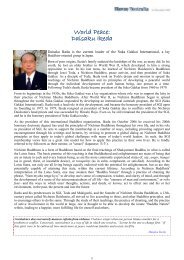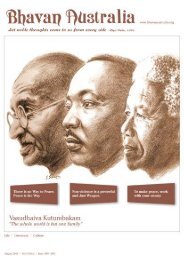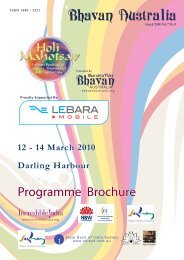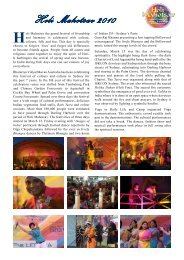The whole world is but one family - Bharatiya Vidya Bhavan Australia
The whole world is but one family - Bharatiya Vidya Bhavan Australia
The whole world is but one family - Bharatiya Vidya Bhavan Australia
Create successful ePaper yourself
Turn your PDF publications into a flip-book with our unique Google optimized e-Paper software.
Legacy of<br />
the Mahatma<br />
26 | <strong>Bhavan</strong> <strong>Australia</strong> | February 2012<br />
Mahatma stood for causes for which he struggled<br />
throughout h<strong>is</strong> working life. <strong>The</strong>y were—Freedom,<br />
Unity, Equality, Self-Reliance and Decentral<strong>is</strong>ation.<br />
<strong>The</strong>y were related to each other. Though these<br />
causes were ‘ends’, he was equally concerned with<br />
‘means’ to achieve those ends. Means based on the<br />
principles of ‘Truth’ and ‘Non-Violence’.<br />
Such was the magnetic influence of h<strong>is</strong> personality,<br />
h<strong>is</strong> thoughts and actions that he was able to<br />
attract the support and cooperation of a galaxy of<br />
towering personalities of h<strong>is</strong> time. Equally he was<br />
able to inspire masses of Indians to participate in<br />
h<strong>is</strong> struggles.<br />
Freedom meant firstly political freedom,<br />
emancipation of India from the Brit<strong>is</strong>h colonial rule.<br />
H<strong>is</strong> struggle for freedom stemmed from h<strong>is</strong> sense<br />
of self-respect and dignity not only of himself <strong>but</strong><br />
of every individual. Th<strong>is</strong> assertion of self respect<br />
began in South Africa where as a young lawyer he<br />
was thrown out of the train on a cold platform of<br />
Citz Mortiz Burg station, despite a valid first class<br />
ticket on the grounds that first class was reserved<br />
only for the Whites.<br />
Gandhi would not accept th<strong>is</strong> tyranny and injustice<br />
even though Indians in South Africa had meekly<br />
succumbed, since they did not have the courage to<br />
oppose the powerful rac<strong>is</strong>t government. But young<br />
Gandhi mobil<strong>is</strong>ed the Indian people, gave them<br />
courage and determination to assert their selfrespect<br />
and join h<strong>is</strong> struggle against the rac<strong>is</strong>t rule<br />
over the next twenty years.<br />
He was not able to see the end of the rac<strong>is</strong>t rule <strong>but</strong><br />
a beginning was made which ultimately culminated<br />
in the end of ‘apartheid’.<br />
Gandhi assumed the leadership of the Congress<br />
Party after the dem<strong>is</strong>e of Lokmanya Tilak. He<br />
launched three mass-movements—the noncooperation<br />
movement in the twenties, the civil<br />
d<strong>is</strong>obedience movement of the thirties and the Quit<br />
India Movement of the forties which culminated<br />
in India’s freedom, accompanied by the tragic<br />
partition of the country.<br />
Lord Meghnad Desai in h<strong>is</strong> book ‘Red<strong>is</strong>covery<br />
of India’ has critic<strong>is</strong>ed Mahatma Gandhi for h<strong>is</strong><br />
agitation<strong>is</strong>t approach, for launching h<strong>is</strong> noncooperation<br />
movement spurning the offer of<br />
Morley Minto reforms aimed at “progressive<br />
real<strong>is</strong>ation of self government.”<br />
He feels that cooperation with the first government<br />
led by Ramsey Macdonald of the Labour Party<br />
of England would have been to the advantage of<br />
the Indian people. Gandhiji and Nehru wanted<br />
‘Sampoorna Swaraj’ which, as declared by Tilak,<br />
was ‘the birth right of the Indian people”.<br />
Gandhi used the techniques of non-cooperation,<br />
non-obedience and ‘Satyagrah’ and mass movement<br />
to fight the colonial rule.









